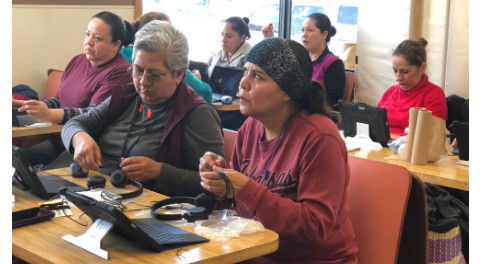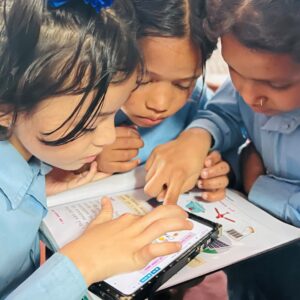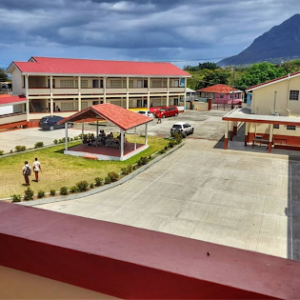
By Anson Green and EdTech Center @ World Education staff
Tyson Foods, World Education, and a nationwide alliance of local adult education leaders are teaming up on a new education program to support thousands of Tyson employees who need an integrated approach to building both foundational English and digital skills. The objectives of the Digital Advancement and Resiliency at Tyson (DART) program are to build engagement in Tyson’s education and training initiatives, make use of Tyson’s human resources (HR) and communication applications, and increase ease and access to information and resources for daily life.
Tyson Foods is a multinational corporation based in the US and one of the world’s largest processors of protein products. In the US, it employs tens of thousands of immigrant and refugee adults, most of whom are English language learners. Many of these employees, ”Tyson team members,” have never logged into the apps used at work due to English literacy levels, unfamiliarity with technology, and lack of access to the internet.
Tyson believes increased ability to use and access online resources supports the inclusion and stability of its employees both on the job and outside of work by opening access to internet-based resources ubiquitous in life, such as supporting the education of their children through online school-based resources, opening a bank account, applying for citizenship, registering to vote, applying for a driver’s license, accessing internet-based shopping, and other conveniences many others take for granted.
Defining the Digital Barriers Under this Project
Over the last few years, Tyson developed Upward Academy, a comprehensive adult education initiative through which Tyson employees can learn English, work toward secondary and postsecondary credentials, and build digital literacy skills. The program also includes digital learning labs at many Tyson sites. Through this initiative, Tyson’s Upward Academy team has gained valuable knowledge to inform the DART project including:
- what challenges must be addressed to best support team members’ access to and use of digital resources and learning, as well as factory equipment with digital interfaces
- what delivery models can meet team members where they are, such as the embedding of bilingual digital navigators into training orientations
- what professional development and curriculum resources are needed to support Tyson’s education partners and trainers to teach digital skills and resilience to diverse learners
- what challenges exist with specific computer hardware, such as Microsoft Surface Go tablets, software, remote updates, and internet connectivity in Tyson plants
- where Tyson needs to lead in the adult education field given that few or no companies or adult education providers are attempting to develop digital resiliency at such emerging literacy levels, resulting in limited existing models, benchmarks, or policies to guide the work
Challenges with Username and Password Security Conventions
Many Tyson team members who are still developing foundational English language proficiency and digital literacy still struggle with technical skills such as powering on or rebooting a computer, using a mouse, and reading essential computer menus to access basic computer functions like opening, using, and doing simple searches with a browser.
But, the challenges start with simply logging in through security sign-on systems, password conventions, and related security features, such as receiving a text or phone message with the verification code. While login conventions are common in online environments, the unique nature of them and obscure requirements such as requirements for certain characters (e.g., certain symbols, upper / lower case, etc.) are not only unfamiliar to many individuals but also difficult to teach. This applies to English language learners and native English speakers alike but is particularly true for adult learners with less familiarity with the Latin alphabet.
Though educators may assume learners have mastered these skills because they can use a smartphone (which requires use of login features), the experience of Tyson staff is that employees often have more digitally-savvy family or friends accomplish the initial set up of platforms like Facebook or WhatsApp, which do not require repeated logging in once set up on a phone.
Solutions for Addressing Digital Barriers
Which Team Members?
The Upward Academy team, through the investment in DART, is particularly interested in models that support digital resiliency for immigrants and refugees who are English language learners, including those with emerging English language literacy or familiarity with the Latin alphabet. Some projects, however, are serving team members with higher English language proficiency, including native English speakers, who lack foundational digital skills.
What Curriculum?
For DART, Tyson developed a workplace literacy curriculum, A-OK To Access, which integrates English language learning, digital skills, and digital resilience. The name A-OK is derived from Tyson’s online security System OKTA, common with public and private employers. A-OK To Access forms the core curriculum and is perhaps unparalleled in that it is designed to accommodate the foundational digital skills needed for English language learners with emerging English language proficiency. It helps these learners develop a username, create and change a password, understand and perform standard login security actions, and access basic online platforms to execute common tasks in Tyson’s HR application, Workday, as well as applications used in everyday life such as email and social media. To document the skills learned in A-OK To Access, Tyson’s curriculum developers aligned the curriculum to both the Comprehensive Adult Student Assessment System (CASAS) ESL standards and digital skills located in the Seattle Digital Equity Initiative Skills Framework (SDEI). The standards and frameworks were useful for Tyson because they articulated true foundational literacy, for example, “Identifying the letters of the English alphabet” (CASAS) or “adapting to new technology” (SDEI).
Rather than setting a goal of focusing exclusively on English skills until a learner could read sufficiently to independently perform login and password creation tasks (which could take a significant amount of time), A-OK To Access supports learners at emerging literacy levels by providing access to basic online learning platforms or native language websites to develop skills typically not mastered until a much higher level of English proficiency.
DART curriculum is also being supplemented by content on the open DigitalSkillsLibrary.org, developed by World Education, with contributions of instructional content organized by the competencies in the Seattle Digital Equity Initiative Framework. Through DART, World Education has trained Tyson educators and trainers on how to search for supplementary instructional content in the Digital Skills Library and the free SkillBlox application, which allows educators to find open educational resources collate content into personalized learning playlists, and share them with individual learners or groups of learners in accessible ways.
Because adult educators teaching in Tyson plants are spread across the country and often teach very unique profiles of Tyson team members, Tyson encourages instructors and trainers to create and share their SkillBlox playlists. As they do so, they form a community of practice that makes accessible the collections of curriculum and resources that meet their learners’ particular needs for demonstrating digital literacy and resilience at work, as well as learners’ interests for digital engagement in other areas of their lives.




